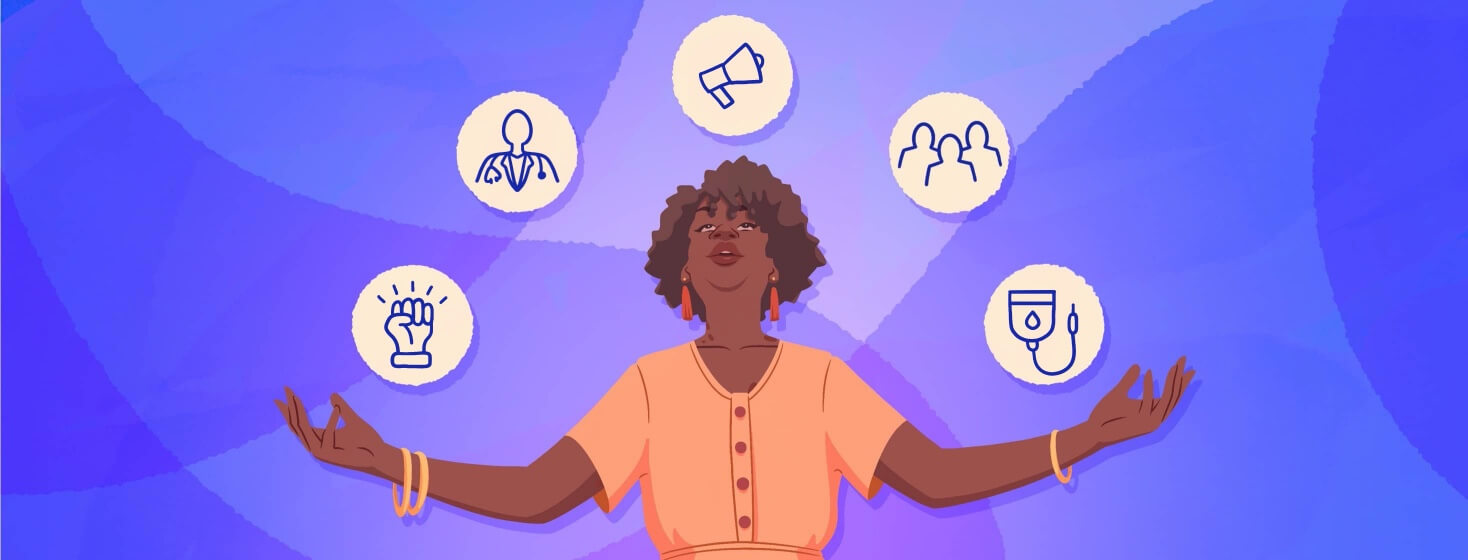Sickle Cell Advocacy and Activism
Today, I took one brief moment to glance at my reflection in the mirror, while I prepared for a big pitch with a pharmaceutical company. As I worked on my annunciation and pacing, scrolling through notes, just trying to ensure that my ideas were cohesive, I had a flashback; the kind that makes the hairs at the back of your neck stand up.
Flashbacks are vivid experiences where you relive certain aspects of traumatic events as if they were happening in real-time. At that moment, I was instantly transported to 1994 when I had bilateral arm surgery due to osteomyelitis. Osteomyelitis can be described as severe inflammation of the bone often caused by an infection and in my case, salmonella bacteria was the culprit.
As little Wunmi was wheeled off into the operating room, I made a promise to God just moments before the anesthesia kicked in. I recited these words “As you lay me down to sleep, I pray the Lord my soul to keep. Lord if you take my pain away then you can make me whole again. I want to live to find a cure so sickle pain is gone forever more.”
Pain into purpose
It was almost like my younger self foreshadowed a curative therapy because, in a lot of ways, I am pain-free, I am made whole, and I am armed with a new identity in advocacy. Although my dreams of becoming a doctor didn’t go as planned, I’ve charted a path less traveled through advocacy and activism – using an ‘unconventional’ approach to advance equitable outcomes for the patient community by harnessing my voice, talent, and lived experience to raise awareness and revise healthcare policies.
I believe that advocates and activists are dedicated to creating positive change in the world. Advocates work on behalf of individuals, groups, organizations, and/or communities, and activists work to galvanize social or political change. Many medical research agencies like the NIH sees health activism as a quintessential act because it creates an arena for people to take control of their own health when others cannot or will not act on their behalf.
Oftentimes, the field of medicine mirrors the racial injustice in our society; it is an industry riddled with racial disparities in everything from research funding to patient care to life expectancy. In an article by the New England Journal of Medicine, there is no population of patients whose health care and outcomes are more affected by racism than individuals living with sickle cell disease (SCD) who are often met with implicit racial/ethnic bias.1
Bias and its effect on advocacy
Patients with SCD are too often marginalized and dismissed while seeking medical care, especially when their bodies hurt, their pain feels excruciating, and they have trouble breathing due to complications of this debilitating disease. The implicit attitude and behavior of healthcare providers have been identified as one of many factors that contribute to these health disparities.1
Implicit attitudes are thoughts and feelings that often exist outside of conscious awareness and thus are difficult to consciously acknowledge and control. The unconscious bias test has shown that many healthcare providers appear to have an implicit bias in terms of showing positive attitudes toward White people and negative attitudes toward people of color. Research even suggests that bias in healthcare is closely linked to poor patient-provider interactions and patient health outcomes.2, 3
What is apparent is that if corporations, health leaders, lawmakers, and complacent governments are not challenged, people with SCD will continue to have limited success in improving their health. It is therefore important that activism goes beyond what is conventional or routine in society. Patient advocates need to challenge the existing policies whenever it is perceived to lead to social injustice or inequality.
An urgent need for sickle cell advocates and activists
There is more to patient advocacy than just raising awareness. It involves ensuring access to care, mobilizing resources, influencing health policy, and addressing health inequities. Advocacy can also mean developing long-term relationships with providers and having open, honest, and explicit conversations about race and the impact of racism on the patients’ life.
We need healthcare providers to be open-minded and self-aware as they care for patients with SCD, recognizing their own implicit biases, and making a conscious effort to treat patients equitably, regardless of race.4

Join the conversation